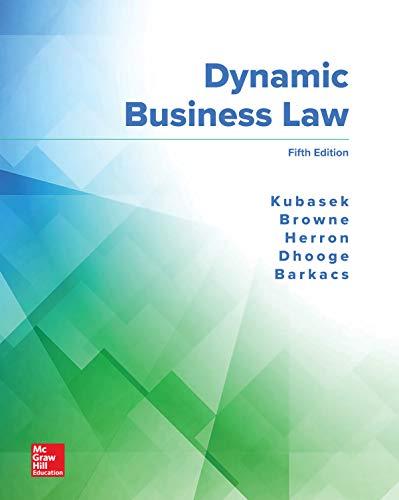Menard, Inc., is a corporation that owns and operates home improvement stores, including a retail store in
Question:
Menard, Inc., is a corporation that owns and operates home improvement stores, including a retail store in the Westgate Center in Columbus, Nebraska. Menard subleased the building from Wal-Mart Stores, Inc. (Walmart). In August 2006, Menard entered a Purchase and Sale Agreement (PA) with Dial-Columbus, LLC (Dial) to purchase a property that Dial owned. Menard wanted to buy the land so that it could relocate its store to the new property and cease the sublease with Walmart.
The PA contained a provision that provided that Dial would assume full responsibility for all terms of the sublease 30 days after Menard opened its new store. Further details of Dial’s responsibilities were set forth in a Lease Agreement (LA) attached to the PA. In February 2007, the parties formally executed the LA. Walmart gave written consent on the condition that Menard was held secondarily liable for the sublease. However, Dial’s name was never on the LA; instead, the LA stated that DKC-Columbus, LLC (DKC) sold the property to Menard and all other provisions of the LA were between DKC and Menard. Terry Clauf signed the lease in his capacity as a member of Dial and DKC. DKC did not exist at the time of the signing.
Menard opened its new store in April 2008. The parties agreed that Dial was responsible for the sublease under the terms of the PA and that DKC was also responsible under the terms of the LA. Either DKC or Dial paid the rent during May and June 2008, but no payments were made thereafter. The sublease expired in 2011, at which point Dial and DKC owed more than $700,000. Walmart sued Menard after failing to recover from Dial and DKC and reached a settlement for $350,000. Menard subsequently brought suit against Dial, DKC, and Clauff. Dial and Clauff filed a joint pleading denying liability, but it was overruled by the court. Menard then filed a motion for partial summary judgment and DKC did not contest.
Clauff opposed the motion, arguing that he was not liable for the Lease Assignment because (1) the future members of DKC-Columbus authorized him to obligate the company to the contract; (2) none of the parties to the Lease Assignment intended for him to be personally liable; and (3) any liability that may have incurred was relieved or discharged after DKC-Columbus formed and adopted the Lease Assignment. The district court granted Menard summary judgment and Clauff appealed.
How did the court rule? What main legal principle is involved in this case? (novation) The court reasoned that there is “some merit in the cases holding that the normally rigid novation rules should be relaxed in circumstances where the corporation forms and adopts the contract because the third party presumably receives everything for which it had bargained and can hardly be labeled a victim.” Do you agree?
Step by Step Answer:

Dynamic Business Law
ISBN: 9781260247893
5th Edition
Authors: Nancy Kubasek, M. Neil Browne, Daniel Herron, Lucien Dhooge, Linda Barkacs





